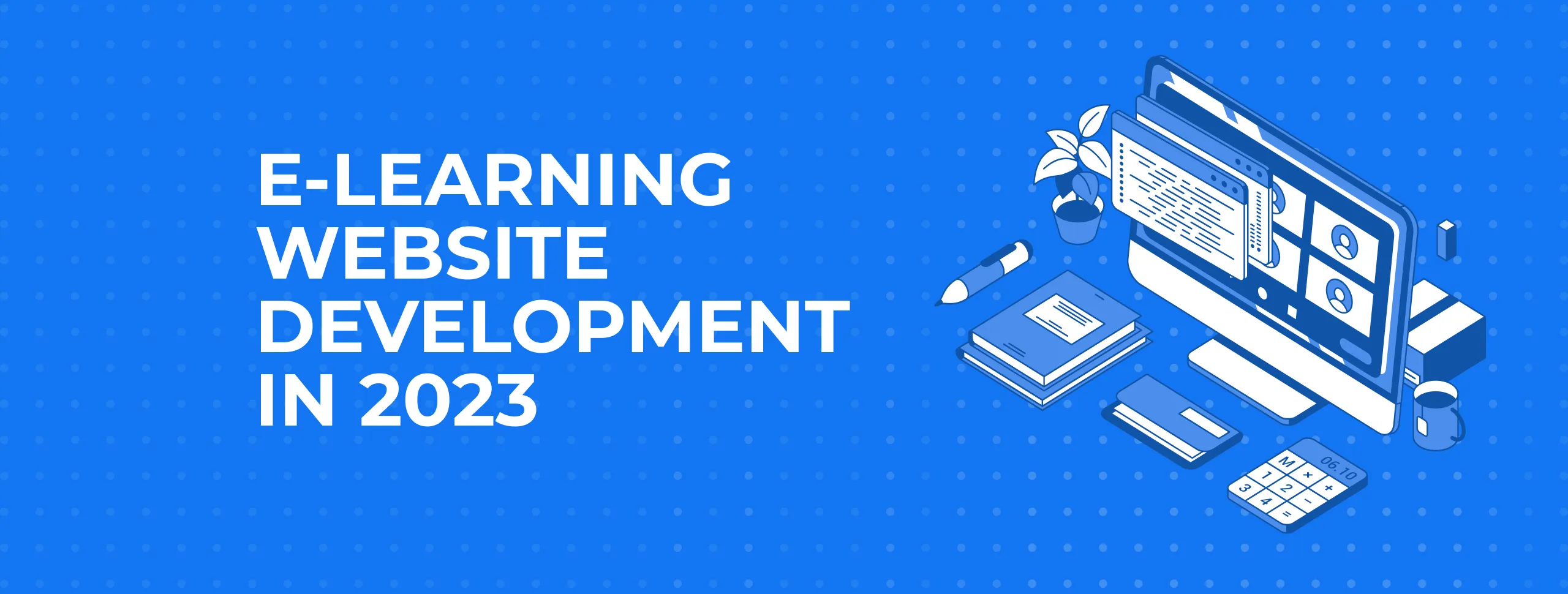
E-Learning Website Development in 2023

Table of contents
- E-Learning Market Overview
- Why Build Your Own E-Learning Website?
- What Types of E-Learning Websites Are There?
- How to Build an E-Learning Website
- How Much Does It Cost to Create an E-Learning Platform?
- E-Learning Website Development – Hiring a Developer vs Building It Yourself
- E-Learning Trends
- Must-Have Features for the MVP Version
- Required Technology Stack to Build an Online Learning Platform
- Monetization Models for Online Learning Platforms
- Cost estimation at Magora and Case Studies
- FAQ
- Conclusion
Humans are curious by nature, and rapid technological progress only augments the number of ways people learn. Today, institutes, schools, and colleges see firsthand the need for an online presence. Business companies also intend to create or have already built their own educational e-learning systems for employees’ training. The fact is that, in the post-pandemic world, people are searching for a more balanced life: they choose family, hobbies, etc. instead of working till they drop. This has caused a high demand for online refresher courses as, according to the LinkedIn study, they are a good way to motivate and retain staff. Moreover, online learning has proven its effectiveness compared to the traditional educational system. Though the Internet has brought us tons of dubious information, it is possible to find a way out. In this connection, if you have ever thought of an educational IT project, it's just high time to create e-learning website. It will be a reliable source of information with a smart study plan enabling effective learning processes.
E-Learning Market Overview
The e-learning websites fling open the window of possibilities for remote education. People of all ages want to stay up-to-date with constant changes and prevent their crucial skills from becoming obsolete. The e-learning audience is rising along with the increasing number of smartphone users—each year there is a 4.2% growth worldwide. Convenience of mobile phone usage encourages people to study; 70% feel more motivated. As another example, fast speed 5G technology implementation also makes its contribution in driving growth of the e-learning market.
- By 2026, the market will presumably reach £272 billion, at a compound annual growth rate (CAGR) of 9.1%.
- In 2022, the MOOC (Massive Open Online Course) market surpassed £6.12 billion. This figure is expected to reach as high as £123 billion by 2032, with a CAGR of 35%.
- E-Learning helps to take care of the environment as it reduces over 85% of carbon dioxide emissions.
- E-Learning also cuts the time needed to learn new training materials by 40%-60% versus traditional classroom systems.
- In 2021, the most favorable conditions for effective e-learning, according to the Preply research, was in Denmark. The United States and Hungary won the second and third prizes respectively.
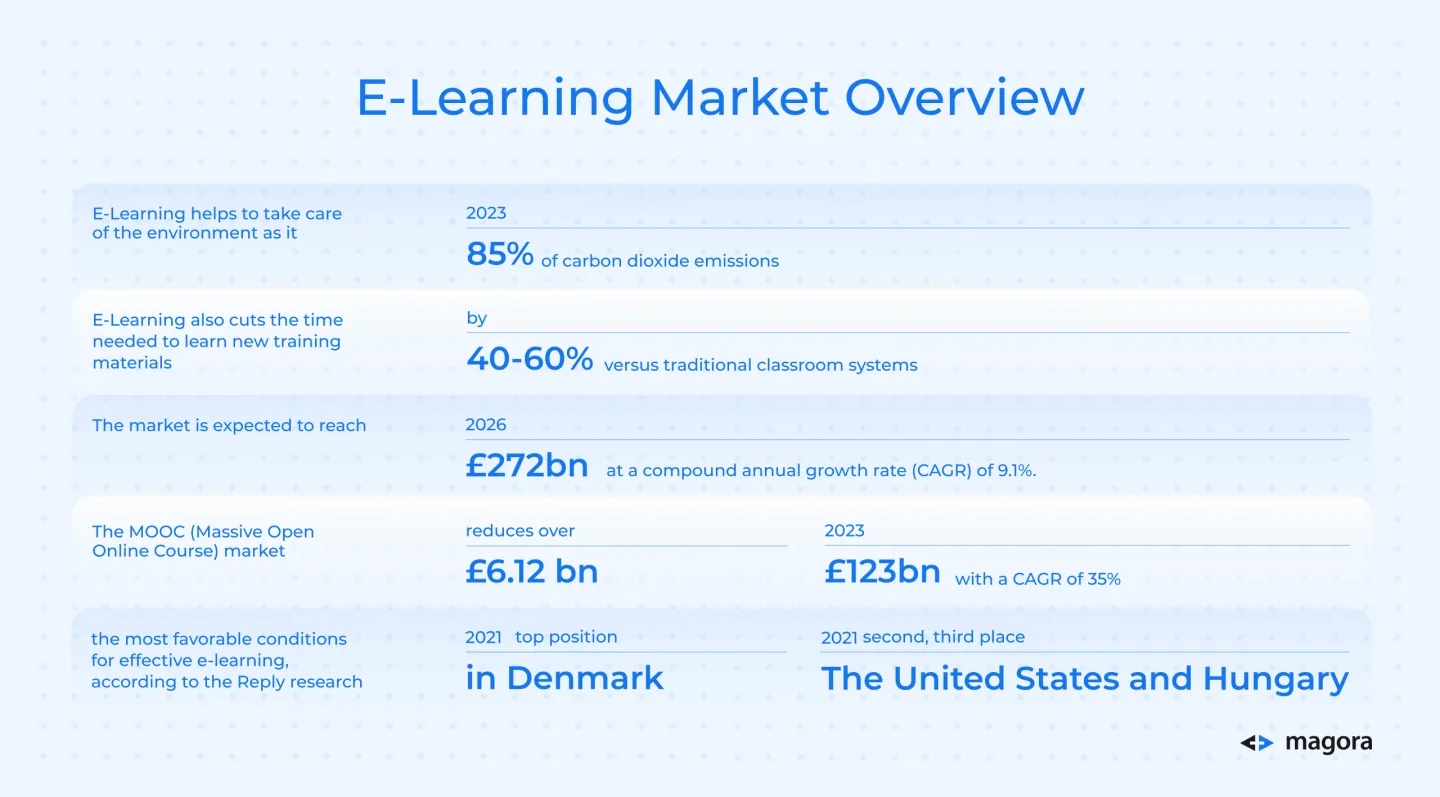
Why Build Your Own E-Learning Website?
Though we have reviewed the impressive size of the e-learning market, let’s look at the numerous benefits of this industry closely.
- Reduced costs. Online learning reduces companies’ spending as there is no need for travel and accommodation expenses for employees, as well as for visiting instructors, meeting room rentals, and printing materials.
- Flexibility. One of the greatest benefits is that e-learning enables learners to study at a comfortable pace from anywhere and at any time.
- Effective learning. E-Learning meets the needs of the new pedagogical shift, providing teachers with new learning methods that are suitable for students and, as a result, enhancing productivity.
- Monitoring and analytics. A learning management system tracks progress, which is good for self-motivation, along with remote control of the learners’ group.
- Scalability. New training ideas and programs can be easily implemented into the learning process. In the modern world, all the new professions are emerging very quickly.
- Learner Satisfaction. Due to individual experience, a “no judgment” atmosphere, and multimedia materials, learners are more inclined to have a positive attitude towards studying.
What Types of E-Learning Websites Are There?
Mainly, there are a lot of different types of e-learning platforms according to their purpose and target audience.
LMS (learning management system)
The key principles of the software lie in providing online courses and learning materials interwoven within the management system. It allows users to create profiles, generate reports and statistics, and track students’ progress. LMS (learning management system) helps automate the routine work and upgrade the efficiency of the training.
Examples: Blackboard, Canvas
Learning Destination Sites
This is an online platform that offers a variety of different courses and learning materials listed by different content providers. Such platforms often use LMS to deliver their programs. They can also act as a bridge by sharing a redirect link.
Examples: Udemy, Coursera, edX
Online Learning Marketplace
Online learning marketplaces are like intermediaries that link tutors and students in one place, facilitating the process of finding and matching the best variants. The teacher’s profile includes a description, rating, and reviews. Moreover, the platform often offers a free lesson to determine whether a student and tutor are on the same wavelength.
Examples: Preply, Tutorme
Educational video platforms
Nowadays, video content is the most popular way of obtaining information. Unlike text, videos make it easier to perceive and assimilate information. Images and diagrams in the video simplify the explanation of complex materials. That is why educational video platforms are so common today.
Examples: TED Talks, Echo 360
Digital libraries
Digital libraries give remote access to a huge information repository that contains books, images, and videos. You can find some rare books that you can borrow for free like in a real library.
Examples: World Digital Library, Open Library
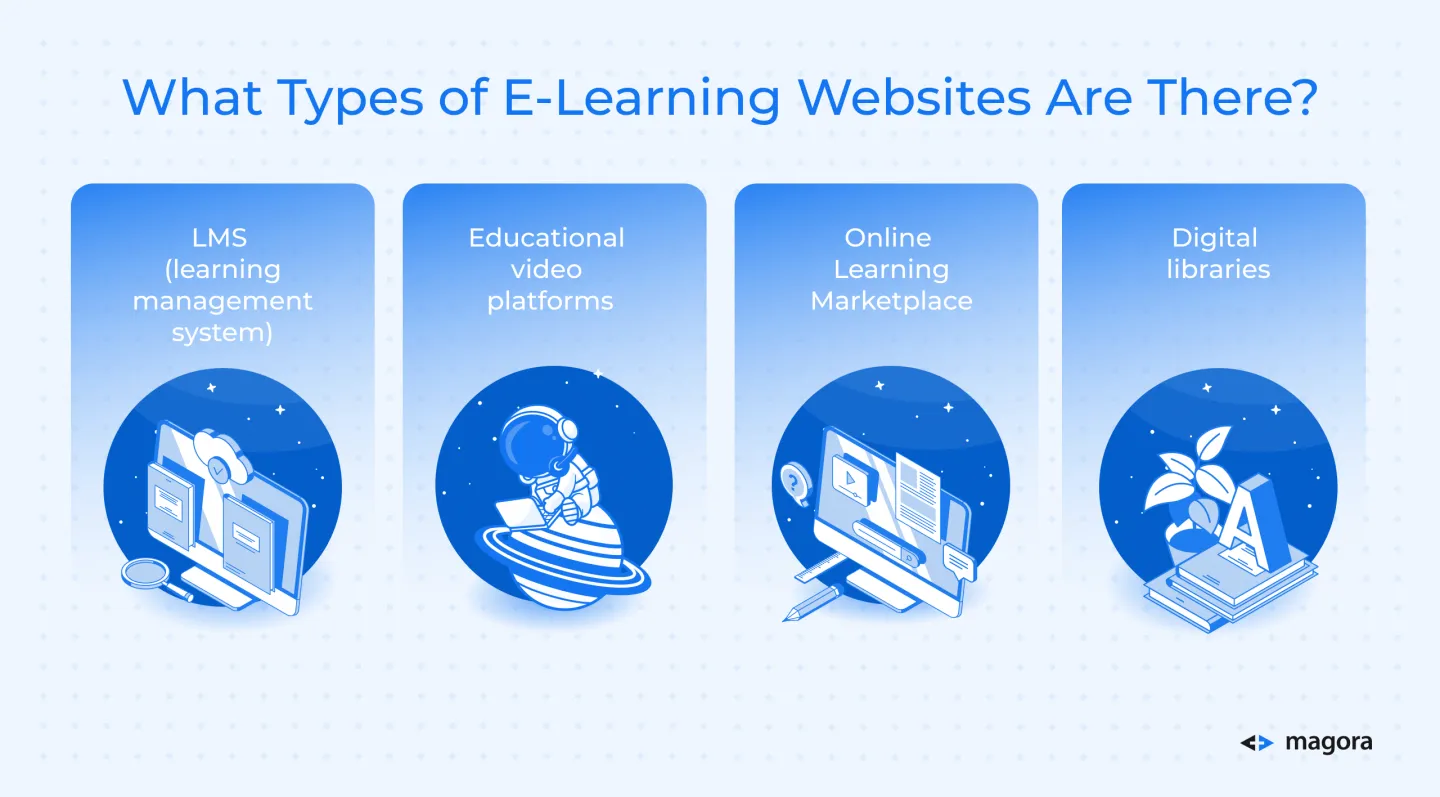
How to Build an E-Learning Website
Step 1: Idea
If you have a bright idea, it certainly should be implemented, but before that, it is better to go deeper into details in order to turn your idea into a working plan. Think ahead about the riskiest moments and the strategies for how to solve and fix any situation in the future. Gauge the market, conduct an in-depth analysis—the better you are equipped, the easier it will be to solve any challenge that may pop up.
Step 2: Target audience
You plan to create a cool digital e-learning project so that people can have access to knowledge and learn in comfort. To build an e-learning website for people, you need to study their habits and preferences. Then choose among them the group that your website will be aimed at.
- What is the average age of the user?
- What country is the user from?
- Is he/she an institute student? Or an employee in a corporation?
- What income does the user earn?
- What features can distinguish your website from others and be beneficial for users?
Such kinds of questions will help you design a truly useful e-learning platform. Research and preparation are very essential parts of the e-learning software development process. It takes time to complete profound studies on all aspects of your project. Moreover, you need to know where to search for information. Or, just confide this work to specialists. The Magora company offers to run a product discovery stage where, on the basis of extensive investigations, we analyze how feasible the idea is, your competitors and the ways to be ahead of them, and the whole market’s performance. At the end of the discovery phase, you will have a clear understanding of the project scope and how the final goal will be achieved. Among the advantages of the discovery phase are a better decision-making process, detailed estimations, and a website prototype.
Step 3: Tutors
You should think about the learning content of your website. Will there be a certain hired tutor? Or will you build partnerships with famous universities or schools? Maybe you have already written your own learning courses.
Step 4: UI/UX Design
At this stage, your initial idea will materialize into a clear, memorable, and logical design with a user-friendly interface. Nothing should distract learners from their studies, and smooth operation should give a nice experience.
Step 5: Development
This step is responsible for converting the prototype into an operational website by working on the code.
Step 6: QA and launch
There are different types of QA testing, like security and performance testing. Such checking of every single part of the system proves the final product’s flaw-free work. Afterwards, the website is ready for deployment.
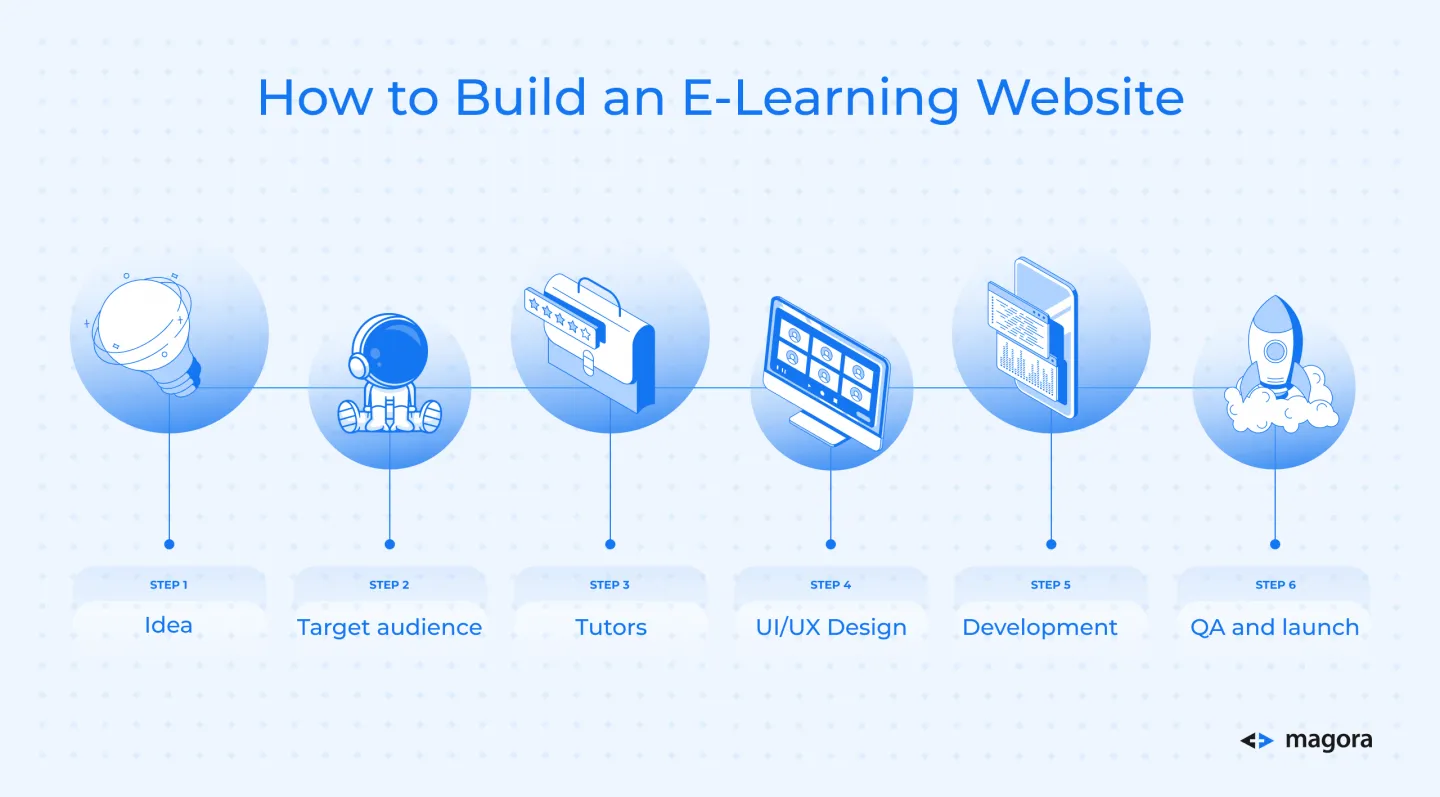
How Much Does It Cost to Create an E-Learning Platform?
During the discovery phase at Magora, we meticulously calculate your app development costs and offer you ways to save money. For example, it might be esigning an MVP or an interactive prototype that provides an understanding of the future product’s operation and its interaction with the audience. The total cost of an e-learning website consists mainly of the following factors.
A complex idea, and therefore a complex website, requires more working hours and a bigger development team.
Depending on the hourly rate, the final cost will vary. Freelancers charge less for all the options, but here you will have to administer the software development process and be the link between developers. Moreover, this option provides less assurance about the quality of the software.
An in-house team is a good variant for those who have multiple software development tasks and a lot of time and money. Recruiting a highly skilled team, renting an office, and paying for sick leave will consume your resources.
An outsourcing company is a “sweet spot” as it combines an expert team, a reasonable price, and the ability to stay away from some organizational moments. The hourly rates of outsourcing companies and freelancers will depend on the country they work in. That is why, it is possible to choose the perfect budget-friendly variant.
E-Learning Website Development – Hiring a Developer vs Building It Yourself
Continuing the theme of the options of hiring, there might be one more situation, when you build an e-learning website by your own efforts. Such a scenario requires certain conditions:
Time. Website development is a time-consuming process, moreover, if it is not your hobby, a new activity might need a lot of patience from you.
The features you want. The thing is that the website constructors have a limited functionality and do not include some complex configurations. The skills you have. This could be just not your strong suit.
Money limit. It is exactly the reason why you would better build the website yourself. The only hurdle for third-party developers is high cost.
If you still question how to create e-learning website yourself, we will give you a brief instruction.
- Choose a domain name. Come up with ideas, check their availability and choose the best. Pick the one that people will easily memorize.
- Find a hosting platform. It is an easy and affordable way to launch your site and store your website’s files. There are a number of different providers to choose from.
- Install WordPress. It is a free software that will help you to create and run your own website. It works like a set of tools where a user doesn’t need to know coding.
- Customize your website using themes. There are thousands of variants in the open library of WordPress. And you can change the design of the website beyond recognition.
- Add features by choosing additional plugins. The chosen theme has already had the basic functionality set. They differ according to the tasks of development.
- Finally, fill up your website with images, videos, and other learning content. Now you are ready to publish it.
E-Learning Trends
In addition to the core features of your website, it is always good to be equipped with trending technologies that will take it to the next level and give you a competitive edge over others.
Gamification
Using games during the learning process is a nice idea, not just for kids. Today, students and adults enjoy participating in quizzes and getting points or badges for their academic achievements. With game simulators, new skills are built through practice. Moreover, games evoke more positive emotions in comparison to boring blocks of text. And this in turn leads to increased motivation and engagement.
Microlearning and Nanolearning
Microlearning is one of the main UK e-learning trends. This is a type of knowledge delivery in which learning materials are presented in small modules of three to ten minutes for microlearning and two minutes for nanolearning. Such brief sessions manage to keep learners’ attention and motivation, as they have clear targets. The information can be expressed in the form of a short video, audio, or text slide.
Artificial Intelligence
There are many benefits that the e-learning industry gets from AI integration. First of all, AI helps create personalized content based on the user’s existing knowledge. Second, AI analyzes huge blocks of data and provides better decision-making. The third advantage is chatbots that help learners immediately solve their educational issues or check a lesson they have learned.
Augmented Reality and Virtual Reality
There are many different variants of VR and AR applications in the e-learning process. You may create a website that easily explains difficult things around us using AR visualization. For employees whose work is connected to danger and risk, VR solutions have become a safe option for training skills.
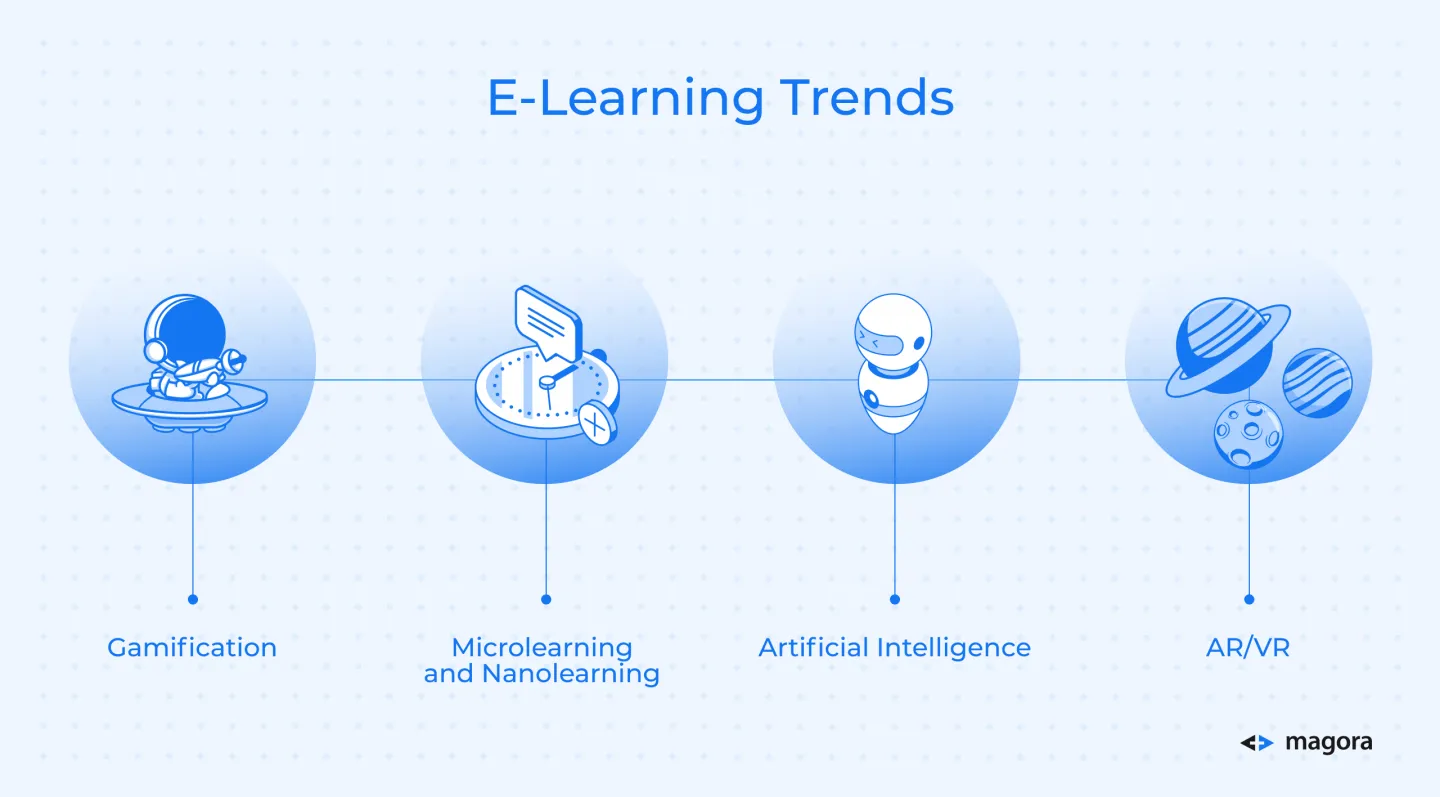
Must-Have Features for the MVP Version
A Minimum Viable Product, or MVP, is a good way to save resources, such as time and money, for the future and test the waters before the product’s final deployment. MVP includes core functionality only. This set of functions can vary depending on the type of your website. We have gathered the most essential ones for your brilliant project.
Registration and login
For the creation of personalized experiences and solving security issues, there must be a registration system that involves quick data collection and authentication procedures or even provides the ability to tie social networks. It is also necessary to envision the password recovery process.
User profile
User profiles are the starting point of your website. Learners and teachers fill out the relevant information. Afterwards, it is possible to see up-to-date information about courses, achievements, and timetables. Teachers have confirmation of qualifications, a professional background description, and a list of courses.
Search engine
There must be a convenient search in order that learners can find an appropriate course or teacher according to the search filter settings. That means the creation of cataloging and using keywords.
Admin panel
To be able to manage your e-learning website, an admin panel should be installed. Any of the admins should have access to content editing and user management, including adding, deleting, and approving.
Payment systems
It is better to have several payment methods: credit cards, PayPal, and Google Pay, as possible variants. There also must be a clear policy on tutors’ salaries, including the issues of how often, how many percent, and the way tutors will receive a salary.
Dashboard
Using a dashboard, learners and teachers will have analytical data at their fingertips. The number of classes taken, the money left on the account, the money earned, the progress bar, and many other useful information.
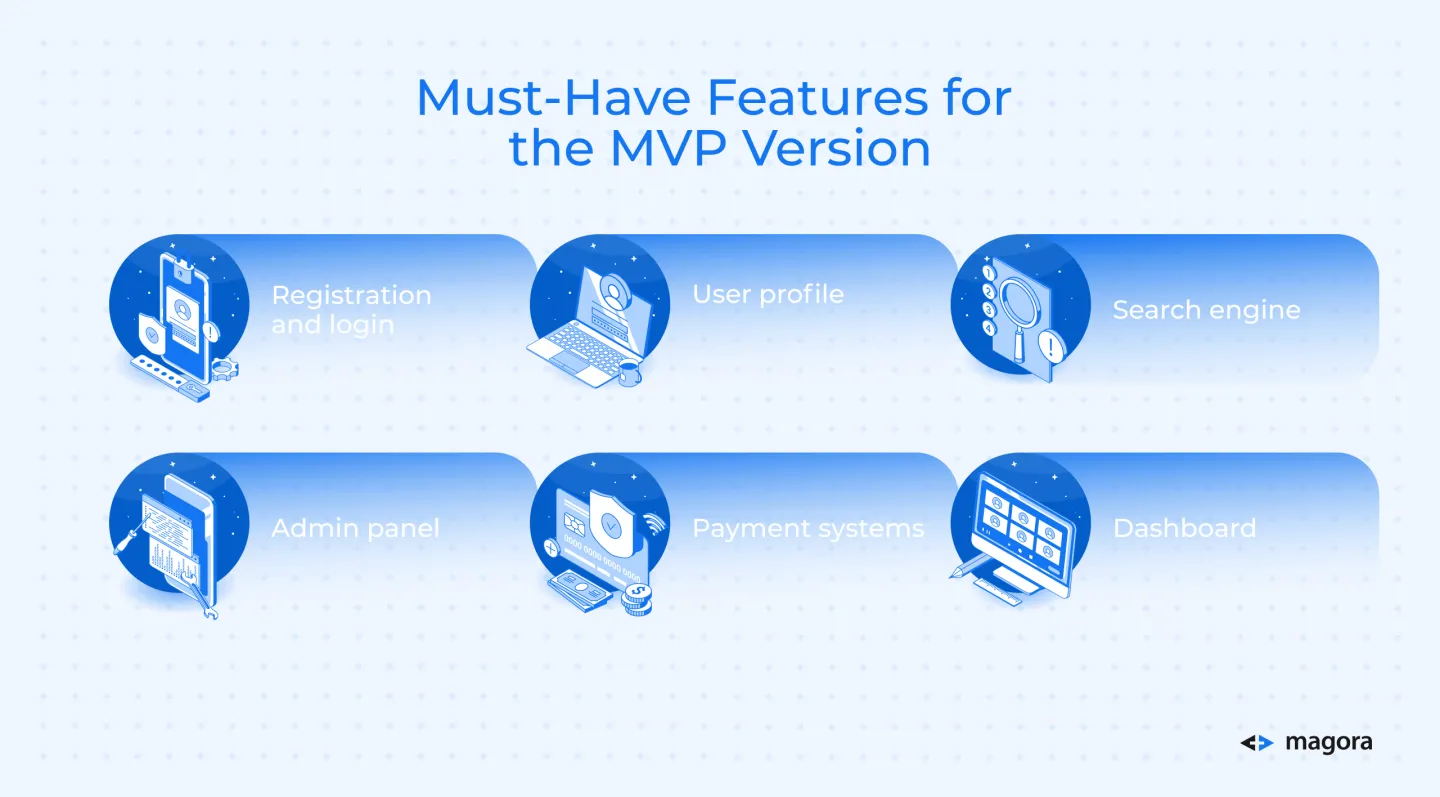
Required Technology Stack to Build an Online Learning Platform
We are ready to offer you the best technological practices that we have accumulated over the years of experience and help you pick the one that will perfectly suit your business needs. At Magora, we constantly improve our tech stack and learn new technologies to provide high-quality, advanced services.
| Frontend | React.JS, Angular.JS and JS |
| Backend | PHP, Node.JS, Java, NET |
| Database management | MySQL, Mongo DB |
| Service provider | AW |
Monetization Models for Online Learning Platforms
With an eye toward realizing a maximum profit on your e-learning website, you need to know all possible options for money flow in this business. There must be a clear money-making strategy for broad outreach to stakeholders.
Subscription
A recurring fee (once a month or annually) allows you to get a steady stream of revenue. Moreover, you have the ability to forecast income and plan future product improvements. As there is a long-term relationship with your customers, it is easier to offer them a subscription upgrade as a trial. Thus, you will increase customer loyalty.
Freemium
This model is good for newcomers as it allows your business to enter the market and get the first feedback. As soon as users assess your website, they will be able to pay for the full version and functionality. You can also provide free courses but charge for the confirmation certificates.
In-app advertising
This monetization model is a very accessible and popular way of making a constant profit. Make your ad native and not irritating to users. Also, be careful with the content.
Commission fees
Your website could be a platform for offering courses to different educational institutions or for placing the services that tutors can provide. Depending on the conditions, you may set different fee rates for every transaction.
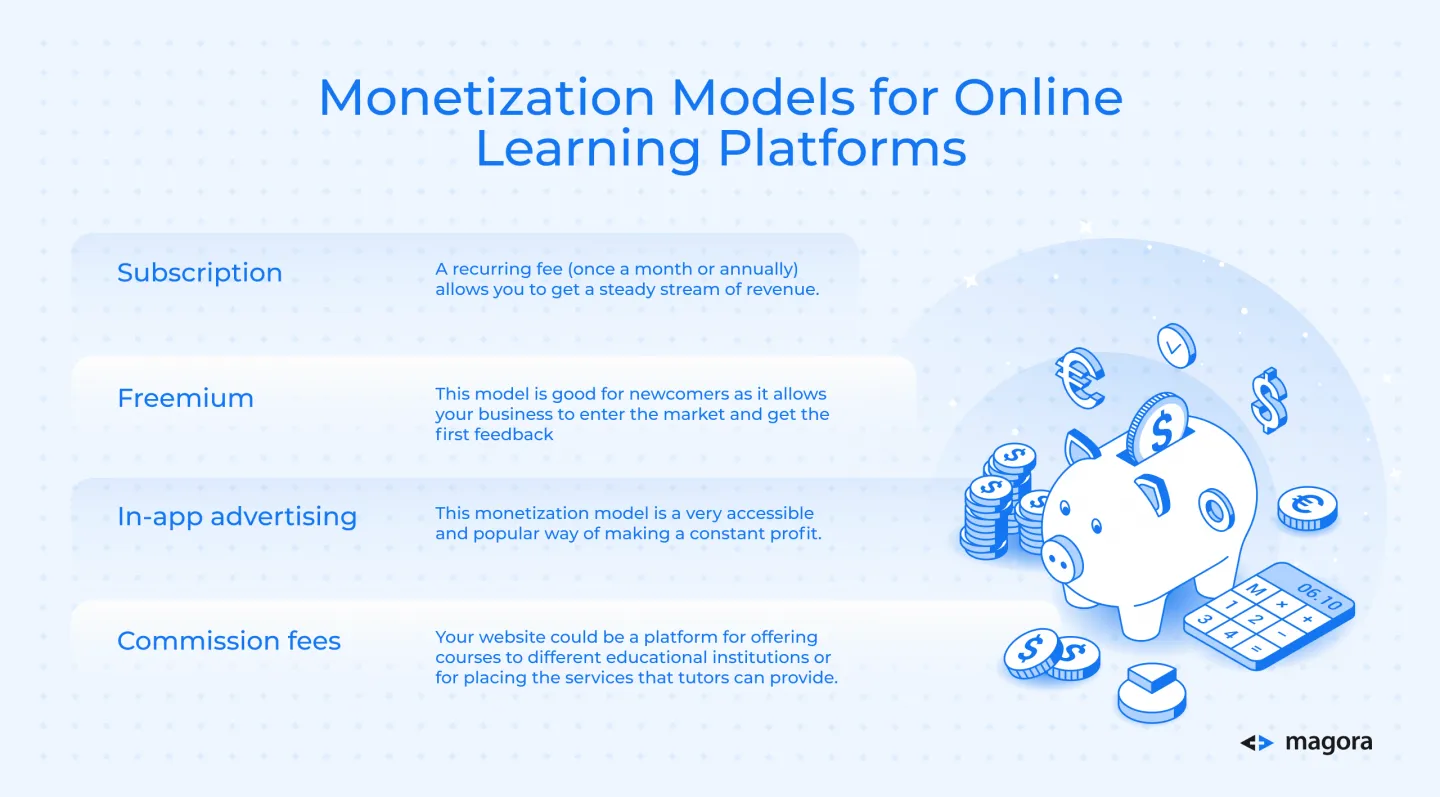
Cost estimation at Magora and Case Studies
During our work on the project, we consider each nuance to be more accurate in our calculations and answer precisely how much does it cost to develop a web application. As we root for the project’s success, we want to guarantee the peak performance of your e-learning website at the time of its deployment and beyond. At Magora, we strive to avoid adding unnecessary features and thereby put all budget lines in order. The average cost of an MVP at Magora starts at £50,000–£100,000. However, we have different strategies if you are limited in time or have a modest budget. Every project is handled individually. Just share your idea, and within 24 hours we will carry out estimations and provide you with an expert opinion. Galaxeeds is one of our educational projects that represents an e-learning platform that is simultaneously aimed at learners who want to get knowledge, teachers who promote their courses and learning materials, and employers who are searching for new talents and professionals. Galaxeeds unites them all in one place. That is why we created a versatile website with multi-user access and a number of essential functions. Magora has designed a simple, but eye-catching solution that conveys the mood of the project’s name.
Learn more about our previous learning projects and discover how to create an educational app with Magora.
FAQ
What does LMS mean?
LMS is an acronym for “learning management system”. It is an educational environment that enables you to manage a wide range of aspects of the learning process, such as creating courses, tracking progress, documenting personal data, etc.
How do I upgrade an e-learning website to the next level?
To improve the attractiveness and productivity of your website, you may implement the latest trends, including gamification, artificial intelligence, and AR or VR technologies. Microlearning is also a very successful way of training today.
Can I create a website myself for free?
Yes, although it will require plenty of time and enough skills from you. If you have a complex task or are short on time, it is better to apply to third-party outsourcing companies.
Is selling courses online a profitable business?
E-Learning websites can be very lucrative, but before that, you need to reach your target audience, create engaging and useful content, and implement it into the smooth operation of your developed website. Then choose one or several monetization models and start making a profit.
Conclusion
The e-learning industry still has impressive prospects. In a competitive world, it is valuable to have access to knowledge and regularly learn new skills. In fact, education also brings positive emotions.
Hence, the Magora company is ready to assemble a team of experts that will convert your idea into a high-quality product, supplementing the process with our keenness on educational projects and considerable experience. We provide constant assistance, attention to detail, and a good mood. Besides, your goals will be achieved in a timely manner.





